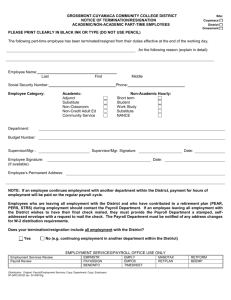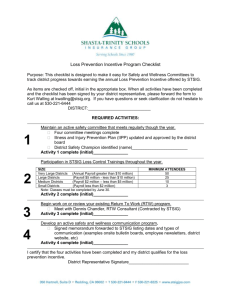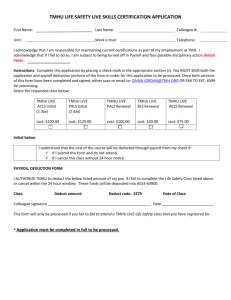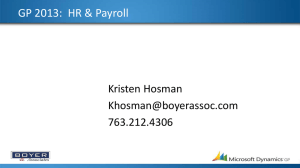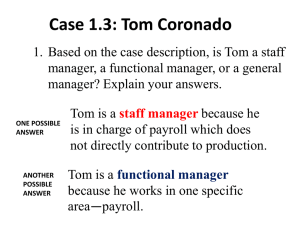Accounting and Payroll Diploma Course Length: 43 weeks
advertisement
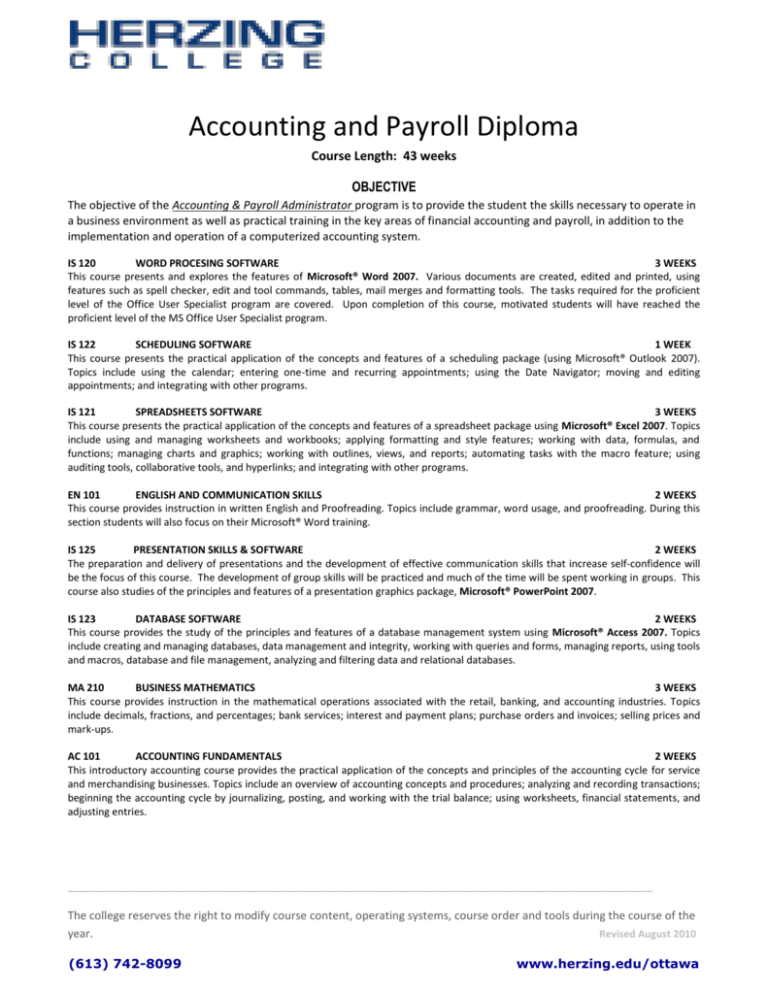
Accounting and Payroll Diploma Course Length: 43 weeks OBJECTIVE The objective of the Accounting & Payroll Administrator program is to provide the student the skills necessary to operate in a business environment as well as practical training in the key areas of financial accounting and payroll, in addition to the implementation and operation of a computerized accounting system. IS 120 WORD PROCESING SOFTWARE 3 WEEKS This course presents and explores the features of Microsoft® Word 2007. Various documents are created, edited and printed, using features such as spell checker, edit and tool commands, tables, mail merges and formatting tools. The tasks required for the proficient level of the Office User Specialist program are covered. Upon completion of this course, motivated students will have reached the proficient level of the MS Office User Specialist program. IS 122 SCHEDULING SOFTWARE 1 WEEK This course presents the practical application of the concepts and features of a scheduling package (using Microsoft® Outlook 2007). Topics include using the calendar; entering one-time and recurring appointments; using the Date Navigator; moving and editing appointments; and integrating with other programs. IS 121 SPREADSHEETS SOFTWARE 3 WEEKS This course presents the practical application of the concepts and features of a spreadsheet package using Microsoft® Excel 2007. Topics include using and managing worksheets and workbooks; applying formatting and style features; working with data, formulas, and functions; managing charts and graphics; working with outlines, views, and reports; automating tasks with the macro feature; using auditing tools, collaborative tools, and hyperlinks; and integrating with other programs. EN 101 ENGLISH AND COMMUNICATION SKILLS 2 WEEKS This course provides instruction in written English and Proofreading. Topics include grammar, word usage, and proofreading. During this section students will also focus on their Microsoft® Word training. IS 125 PRESENTATION SKILLS & SOFTWARE 2 WEEKS The preparation and delivery of presentations and the development of effective communication skills that increase self-confidence will be the focus of this course. The development of group skills will be practiced and much of the time will be spent working in groups. This course also studies of the principles and features of a presentation graphics package, Microsoft® PowerPoint 2007. IS 123 DATABASE SOFTWARE 2 WEEKS This course provides the study of the principles and features of a database management system using Microsoft® Access 2007. Topics include creating and managing databases, data management and integrity, working with queries and forms, managing reports, using tools and macros, database and file management, analyzing and filtering data and relational databases. MA 210 BUSINESS MATHEMATICS 3 WEEKS This course provides instruction in the mathematical operations associated with the retail, banking, and accounting industries. Topics include decimals, fractions, and percentages; bank services; interest and payment plans; purchase orders and invoices; selling prices and mark-ups. AC 101 ACCOUNTING FUNDAMENTALS 2 WEEKS This introductory accounting course provides the practical application of the concepts and principles of the accounting cycle for service and merchandising businesses. Topics include an overview of accounting concepts and procedures; analyzing and recording transactions; beginning the accounting cycle by journalizing, posting, and working with the trial balance; using worksheets, financial statements, and adjusting entries. ________________________________________________________________________________________________________ The college reserves the right to modify course content, operating systems, course order and tools during the course of the year. Revised August 2010 (613) 742-8099 www.herzing.edu/ottawa AC 104 COMPUTERIZED ACCOUNTING 3 WEEKS This course is designed to provide practical application of accounting principles using an accounting package. Topics include system basics and file setup; general ledger setup; invoicing and purchasing transactions; accounts payable and receivable; cash receipts and disbursements; job costing and reporting. PD 200 CAREER DEVELOPMENT AND CLIENT SERVICES 1 WEEK This course provides a critical examination of issues embedded in the practice of providing client service. Topics include research about best practice in customer service and communication techniques; psychologically based methods for dealing with the management of customer complaints; and the roles of a customer service employee and supervisor within ethical boundaries and common business practice. This course deals with the development of the student’s career path, including job search skills. AC 102 ACCOUNTING I 2 WEEKS This introductory accounting course provides the practical application of the concepts and principles of the accounting cycle for service and merchandising businesses. Topics include an overview of accounting concepts and procedures; analyzing and recording transactions; beginning the accounting cycle by journalizing, posting, and working with the trial balance; using worksheets, financial statements, and adjusting entries; completing the accounting cycle with adjusting, closing, and post-closing trial balance; working with cash and its control; working with accounting systems, journals, and internal controls; and payroll concepts and procedures. AC 103 ACCOUNTING II 2 WEEKS This accounting course provides instruction in the concepts and principles of accounting for partnerships and corporations and the analysis of financial statements. Topics include accounting for partnerships, corporate accounting, accounting for long-term liabilities, capital assets, investments, and the analysis and interpretation of financial statements. AC 201 INTRODUCTION TO PAYROLL & PAYROLL SOFTWARE 2 WEEKS This course introduces students to the function, objectives, and responsibilities of the payroll department while providing the practical application of payroll principles using QuickBooks. The federal, Ontario, and Quebec employment standards relating to the payroll process are detailed. Topics include payroll processing methods; hours of work; leaves; terminations; payroll deductions; taxable benefits; pension plans; employment insurance premiums; income tax; calculating net pay; and records of employment. AC 105 ACCPAC SOFTWARE 2 WEEKS This course is designed to provide practical application of accounting principles using the ACCPAC for windows and ACCPAC plus accounting packages. The course covers the General Ledger, System Manager (common services), Accounts Payable and Accounts Receivable modules. Topics include setting up each application; transaction processing using source documents; invoicing and purchasing transactions; accounts payable and processing; and working with budgets, business analysis, business simulations, and the batch system. AC 202 PAYROLL – LEVEL I 2 WEEKS This module will introduce the student to set-up options of Payroll and how they can be customized to fit the business requirements. Students will gain knowledge of the payroll ledger and reports, customized settings, payroll linked accounts, how to create employee records. They will also be able to enter payroll transactions, adjust payroll entries, calculate net pay and produce records of employment. AC 203 PAYROLL – LEVEL II 2 WEEKS This module will build on the knowledge and skills gained in Payroll Level 1. It will enhance the students’ ability to set-up options of Payroll and how they can be customized to fit the business requirements. Students will learn the correct procedures for payroll processing and the necessary steps to correctly establish customize your payroll environment. In addition, students will learn how to create and integrate employee earnings, deductions, garnishments, tax tables and employee settings. BU 202 BUSINESS LAW AND ETHICS 2 WEEKS This course provides a study of the Canadian legal system and its effect on business and business organizations, as well as an overview of the ethical issues that businesses encounter. Topics include business law and ethics, contracts and sales, consumer protection issues. WE 300 INTERNSHIP 7 WEEKS The internship component of the program is the practical application of a student’s knowledge and skills in an industry environment. The industry shall be directly related to the student’s program of study. The internship requires full-time day attendance working in the industry setting. ________________________________________________________________________________________________________ The college reserves the right to modify course content, operating systems, course order and tools during the course of the year. Revised August 2010 (613) 742-8099 www.herzing.edu/ottawa

